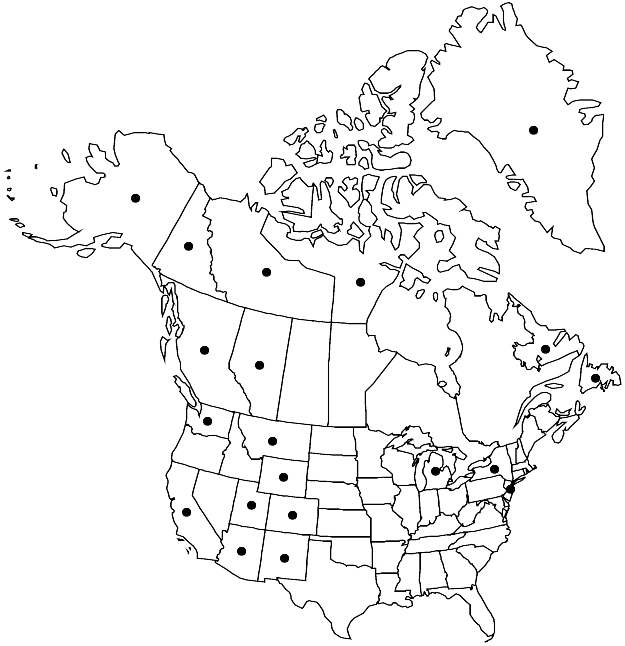Difference between revisions of "Ptychostomum cyclophyllum"
Phytologia 87: 20. 2005.
FNA>Volume Importer |
FNA>Volume Importer |
(No difference)
| |
Revision as of 22:01, 16 December 2019
Plants in dense or open turfs, green or yellow-green. Stems 0.5–3(–4) cm, fertile stems comose, innovations evenly foliate. Leaves green, somewhat distant, strongly contorted to shrunken when dry, broadly ovate to orbicular, flat or weakly concave, 0.5–3 mm, not much enlarged toward stem apex; base green, weakly decurrent; margins plane, limbidium strong, in 2 or 3 rows; apex broadly acute to obtuse; costa not reaching apex, rarely nearly percurrent, apiculus absent; proximal laminal cells long-rectangular, 3–5:1; medial and distal cells 18–24 µm wide, 2–3:1, walls thin. Specialized asexual reproduction rare, by leaf axil gemmae, brown, finely papillose. Sexual condition dioicous. Seta red or brown, 2–4(–5) cm, slender, straight to somewhat flexuose. Capsule yellow-brown to brown, obovate, symmetric, 2–4 mm, mouth yellow; operculum short-conic, weakly apiculate; peristome well developed; exostome teeth yellow basally, hyaline distally, lamellae straight, pores absent near base along mid line; endostome not adherent to exostome, basal membrane 1/2 exostome height, segments with ovate perforations, cilia long, appendiculate. Spores 14–16 µm, smooth or finely papillose, pale yellow.
Phenology: Capsules mature Jun–Sep.
Habitat: Wet sandy or organic soil, along streams, wetlands
Elevation: low to high elevations (0-3000 m)
Distribution

Greenland, Alta., B.C., Nfld. and Labr., N.W.T., Nunavut, Yukon, Alaska, Ariz., Calif., Colo., Mich., Mont., N.J., N.Mex., N.Y., Utah, Wash., Wyo., Asia (India, Nepal).
Discussion
Ptychostomum cyclophyllum is a distinctive arctic-boreal species with broadly ovate to orbicular, blunt, more or less flat leaves that are strongly shrunken when dry. Ptychostomum neodamense and P. subneodamense are similar, but have much shorter proximal laminal cells, 1-stratose borders, and red leaf bases. The occurrence of P. cyclophyllum has probably declined in the United States, as the plants grow in wetlands and along streams in mid elevation regions, areas where human development is often concentrated.
Selected References
None.